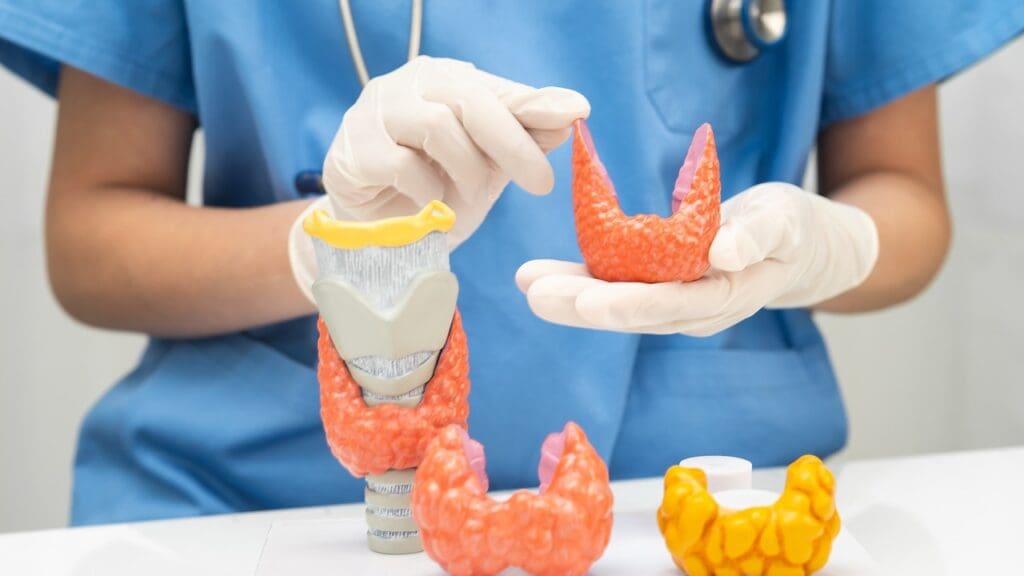Thyroid Symptoms
Thyroid symptoms can vary widely because the thyroid gland affects nearly every organ system in the body. When the thyroid produces too much hormone or too little, noticeable physical and emotional changes can appear. Many people experience fatigue, mood shifts, changes in weight, sensitivity to temperature, or changes in heart rhythm. Thyroid symptoms may develop slowly or suddenly depending on the underlying condition.
Because thyroid symptoms can mimic other health issues, timely testing and medical evaluation are essential. Liv Hospital provides specialized diagnostics and endocrinology support to help patients understand the cause of their symptoms and receive accurate treatment.
Common thyroid symptoms include:
• Unexplained weight gain or weight loss
• Hair thinning or brittle hair
• Dry skin
• Rapid or irregular heartbeat
• Changes in bowel habits
• Anxiety or irritability
• Persistent tiredness or low energy
• Difficulty concentrating
• Menstrual irregularities
Recognizing thyroid symptoms early helps prevent long term complications and ensures that the right treatment begins promptly.

Thyroid Cancer
Thyroid cancer is a condition that forms in the thyroid gland and is one of the fastest growing cancer diagnoses worldwide. Most cases are treatable, especially when detected early. The majority of thyroid cancer cases develop slowly, but some types grow more aggressively. Liv Hospital uses modern imaging and biopsy techniques to support accurate diagnosis and personalized treatment plans.
Thyroid cancer occurs when abnormal thyroid cells grow uncontrollably. These cells form tumors within the gland and may spread to lymph nodes or other organs if left untreated. Because many people do not feel any pain in early stages, regular checkups help ensure early discovery.
Thyroid Cancer Symptoms
Thyroid cancer symptoms are often subtle at first. A painless lump in the neck is the most common sign. Some individuals experience difficulty swallowing, persistent sore throat, voice changes, or swollen lymph nodes. Thyroid cancer symptoms may also include discomfort in the neck or a feeling of pressure when lying down.
Even though many thyroid cancer symptoms can be caused by benign nodules or infections, medical evaluation is important. Liv Hospital specialists examine each symptom carefully and recommend appropriate tests such as ultrasound, fine needle biopsy, and hormone analysis.
Thyroid Nodule
A thyroid nodule is a small lump or growth within the thyroid gland. Most thyroid nodules are harmless and do not cause symptoms. However, some nodules may produce excess hormones, interfere with swallowing, or rarely become cancerous.
Thyroid nodules are common in adults and increase with age. Doctors usually detect them through routine exams or imaging scans done for unrelated reasons. Evaluation typically includes ultrasound imaging, hormone testing, and sometimes biopsy. Liv Hospital uses advanced imaging systems to assess thyroid nodules and determine whether they require treatment or monitoring.
Thyroid Eye Disease
Thyroid eye disease is an autoimmune condition often associated with hyperthyroidism. It affects the muscles and tissues around the eyes, leading to visible changes. People may experience eye bulging, dryness, double vision, irritation, or swelling around the eyelids. Thyroid eye disease can significantly affect daily life and self confidence, making timely medical care essential.
Eye specialists and endocrinologists work together to manage thyroid eye disease. At Liv Hospital, patients receive comprehensive care that focuses on both hormonal balance and eye health. Treatments may include medication, lubricating drops, lifestyle modifications, or surgical options for severe cases.
Thyroid Gland
The thyroid gland is a small butterfly shaped organ located in the lower front part of the neck. Despite its size, it plays a vital role in regulating metabolism, controlling body temperature, supporting heart function, and maintaining energy levels.
The thyroid gland produces two primary hormones called T3 and T4. These hormones travel through the bloodstream and influence how fast or slow the body uses energy. When the thyroid gland becomes overactive or underactive, health problems arise. Maintaining a healthy thyroid gland is essential for overall well being.
Thyroid Nodules
Thyroid nodules are growths that form within the thyroid gland. Some nodules produce extra thyroid hormones, causing symptoms of hyperthyroidism. Others remain inactive but may cause cosmetic or swallowing concerns. Although many thyroid nodules are benign, a small percentage may become cancerous.
Regular follow up is important for thyroid nodules. Ultrasound, hormone tests, and biopsies help determine whether a nodule requires treatment. Liv Hospital provides ongoing monitoring for patients with thyroid nodules to ensure early detection of changes.
Armour Thyroid
Armour thyroid is a natural desiccated thyroid medication derived from animal thyroid glands. It contains both T3 and T4 hormones, making it an alternative to synthetic thyroid medications. Some patients prefer armour thyroid because they feel it provides more stable symptom control. However, dosage adjustment must be handled carefully.
Doctors evaluate thyroid levels through blood tests before prescribing armour thyroid. Monitoring ensures that patients receive the correct balance of hormones. Liv Hospital endocrinologists help patients choose the safest and most effective medication for thyroid disorders.
Blood Test for Thyroid TSH
A blood test for thyroid TSH is the most common test used to evaluate thyroid function. TSH stands for thyroid stimulating hormone. High TSH levels indicate an underactive thyroid, while low levels suggest an overactive thyroid. The blood test for thyroid TSH helps diagnose conditions like hypothyroidism, hyperthyroidism, and thyroid inflammation.
Because the blood test for thyroid TSH is simple and highly reliable, it is often the first step in assessing thyroid symptoms. Additional tests may be ordered to measure T3, T4, or thyroid antibodies. Liv Hospital provides full thyroid panels for accurate and timely diagnosis.
Thyroid Peroxidase Antibodies
Thyroid peroxidase antibodies are substances produced by the immune system that attack thyroid tissue. High levels of thyroid peroxidase antibodies indicate autoimmune thyroid disease, such as Hashimoto thyroiditis or Graves disease. Testing for thyroid peroxidase antibodies helps determine whether thyroid dysfunction is caused by an autoimmune condition.
Autoimmune thyroid disorders may develop slowly and require long term monitoring. Liv Hospital specialists create personalized treatment plans for patients with elevated thyroid peroxidase antibodies to manage symptoms and preserve thyroid function.
Enlarged Thyroid
An enlarged thyroid is known as a goiter. It may occur due to iodine deficiency, autoimmune disease, inflammation, or hormone imbalance. Some individuals with an enlarged thyroid experience difficulty swallowing, breathing issues, or a noticeable swelling in the neck. Others may have no symptoms at all.
Treatment for an enlarged thyroid depends on the underlying cause. Medication, hormonal therapy, iodine supplements, or surgery may be recommended depending on the situation. Liv Hospital evaluates each patient individually to determine the safest treatment approach.
Hyperthyroidism Thyroid Problems
Hyperthyroidism thyroid problems occur when the thyroid gland produces too much hormone. This accelerates metabolism and leads to symptoms such as anxiety, rapid heartbeat, heat intolerance, weight loss, and tremors. Hyperthyroidism thyroid problems may result from conditions like Graves disease, thyroid nodules, or thyroid inflammation.
Treatment options include medication, radioactive iodine therapy, or surgery. Managing hyperthyroidism thyroid problems requires professional evaluation and long term monitoring to prevent complications. Liv Hospital provides a multidisciplinary approach for safe and effective management.

Low Thyroid Symptoms
Low thyroid symptoms, also known as hypothyroid symptoms, occur when the thyroid does not produce enough hormone. These symptoms may include fatigue, dry skin, depression, constipation, cold intolerance, and weight gain. Low thyroid symptoms may develop slowly, making them easy to overlook.
A blood test for thyroid TSH helps diagnose low thyroid symptoms quickly. Once diagnosed, treatment usually involves daily hormone replacement therapy. Liv Hospital offers ongoing care to ensure that patients with low thyroid symptoms receive proper monitoring and dose adjustments.
Papillary Thyroid Cancer
Papillary thyroid cancer is the most common type of thyroid cancer. It typically grows slowly and responds well to treatment. Many patients with papillary thyroid cancer have excellent long term outcomes with early detection. Symptoms may include a neck lump, swollen lymph nodes, or voice changes, although some patients experience no symptoms.
Treatment for papillary thyroid cancer often includes surgery, followed by radioactive iodine therapy if necessary. Liv Hospital provides comprehensive cancer care that includes modern imaging, precise surgery, and long term follow up.
Carcinoma Thyroid Treatment
Carcinoma thyroid treatment depends on the type and stage of the cancer. Options may include surgery, radioactive iodine, hormone suppression therapy, targeted therapy, or external radiation. The goal of carcinoma thyroid treatment is to eliminate cancer cells, prevent recurrence, and maintain thyroid hormone balance.
Liv Hospital emphasizes personalized carcinoma thyroid treatment plans to achieve the best outcomes. Specialists from endocrinology, oncology, radiology, and surgery coordinate care to support every patient through treatment and recovery.
Conclusion
Thyroid conditions vary from simple hormonal imbalances to more complex diseases such as thyroid cancer or autoimmune disorders. Recognizing symptoms, undergoing proper testing, and seeking medical evaluation are essential steps toward improved health. Liv Hospital provides advanced thyroid diagnostics, treatment programs, and long term care to help patients manage thyroid disorders confidently and effectively. If you or someone you know is experiencing thyroid related symptoms, professional evaluation is the safest path toward clarity and healing.
* Liv Hospital Editorial Board has contributed to the publication of this content .
* Contents of this page is for informational purposes only. Please consult your doctor for diagnosis and treatment. The content of this page does not include information on medicinal health care at Liv Hospital .
For more information about our academic and training initiatives, visit Liv Hospital Academy
Frequently Asked Questions
What are common thyroid symptoms?
Fatigue, weight changes, hair thinning, dry skin, and mood shifts are among the most frequent symptoms.
Can thyroid issues cause weight gain or weight loss?
Yes, an underactive thyroid often causes weight gain, while an overactive thyroid can lead to weight loss.
What is a thyroid nodule?
It is a small lump in the thyroid gland, usually harmless, but sometimes requiring monitoring or biopsy.
Are thyroid nodules always cancerous?
No, most thyroid nodules are benign, but evaluation is needed to rule out cancer.
What is thyroid cancer?
It is an abnormal growth of thyroid cells that can form tumors and may spread if untreated.
What are early symptoms of thyroid cancer?
A painless neck lump, voice changes, and difficulty swallowing are common early signs.
What does a TSH blood test check?
It measures thyroid stimulating hormone to assess whether the thyroid is underactive or overactive.
What is thyroid eye disease?
It is an autoimmune condition affecting the eyes, causing bulging, irritation, and swelling.
What causes hypothyroidism?
It usually results from autoimmune disease, iodine deficiency, or thyroid inflammation.
How are thyroid disorders treated?
Treatment may include medication, radioactive iodine, surgery, or long term hormone therapy depending on the condition.



